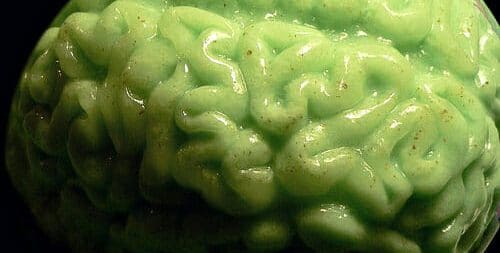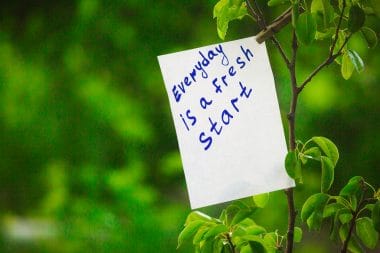One of the bigger challenges in losing weight is getting your mind aligned with your goals. More often, your mind is aligned with what you DON”T want — bad habits, laziness, avoiding exercise, and self-destructive actions of all kinds.
Losing weight is hard under those conditions — if not completely impossible. You’re constantly fighting an inner battle every time you need to make a decision about eating or exercise.
You have a strong desire to take the best actions to lose weight and achieve your goals, but . . . you also don’t want to take those actions because they require a lot more effort than taking the easy way and sticking with your old habits.
One of the most effective techniques for bridging the gap between mind and body is visualization.
Visualization can help you lose weight in two basic ways:
First, it can help you to overcome those inner barriers we just covered.
If you do it right, changing your habits will seem almost effortless. You’ll reduce the likelihood of self-sabotage and find it much easier to adopt healthy habits and stay with them for good.
Second, visualization can be incredibly motivating.
One of the major reasons why people give up on their healthy diet and exercise plan is because they just get bored with it. They get tired of eating the same old foods day after day, they get tired of doing the same workouts day after day, and they just lose interest.
Visualization is a great antidote for low motivation. It’s one of the best ways to renew your motivation each day and keep it going strong all the way to your goal.
Visualization can also be used for plenty of other goals you may have besides weight loss. It’s a powerful tool that’s used often by business people, athletes, celebrities, and successful people in all walks of life.
We’re going to focus on the weight loss application in this guide, but keep in mind that you can easily use the same process for any goal you may be working toward, now or in the future.
What is Visualization?
Visualization is the process of seeing images in your mind.
For example, if I asked you to think about a sunrise, you’d probably see a quick mental image of the sun rising up over the horizon. If I asked you to think about an apple, you’d see it mentally just like you saw the sunrise.
If you’re like most people, you didn’t have a problem “seeing” these things mentally.
However, there are some people who have a difficult time visualizing images. They can think about dozens of different objects but they don’t really “see” them mentally.
If that’s your experience too, don’t worry about it. Believe it or not, you don’t really have to see images mentally in order to use visualization effectively.
I’m going to share some other tips that will help you use visualization regardless of whether you can see mental images or not.
Using Visualization for Weight Loss
To use visualization for weight loss, you simply need to create little “mental movies” about situations that you want to make true. Below we’ll go over some of the most common ways to use visualization for weight loss.
Before we do that, it’s important to note that visualization will be much more effective for you if you take the time to get very relaxed first. Feeling stressed or tired will make it harder for you to concentrate, and your visualization sessions won’t be nearly as effective.
To get relaxed, take 5 to 10 minutes to sit quietly and release tension from your mind and body. Breathe deeply and slowly, imagining that you are releasing tension and stress with every exhalation.
Focus in on each muscle group in your body and let it relax, one at a time. You can even visualize the muscles slowly letting go, becoming nice and limp and relaxed.
When you feel fully relaxed and calm, then you can start with one of the visualization techniques below:
Visualizing the End Result
The most common use for visualization is seeing the “end result” of the goal you are trying to accomplish. For weight loss purposes, you would focus on a mental image of yourself weighing what you want to weigh and wearing the size and style of clothing you want to wear.
You might picture yourself in a certain setting that you’ve been looking forward to, like your high school reunion, a family wedding, or just lounging on the beach in a bathing suit.
You can also make the visualization more active by focusing in on a physical activity you are doing at the time. For example, you might see yourself jogging, swimming, playing with your children, or walking down the street with your head held high, oozing confidence with every step.
Include as many details in this vision as you can. What are you wearing? How do you feel? What does your hair look like? Who is with you in the vision? What do your surroundings look like? What do they smell like? What are the weather and temperature like?
Focusing in on these little details can help make your visualization sessions much more realistic and therefore much more powerful.
Stay with the vision for as long as you like — 10 minutes or so is great, but you can do it for longer if you wish.
Try to make the vision so real and strong that you feel as if you are truly there, experiencing it right now.
Visualization for Motivation
Getting motivated with visualization is easier than you might think, and it doesn’t take a long time to do.
Start by getting very relaxed, and then think about what it feels like to be motivated. You’ve certainly experienced the feeling of being motivated at some time or another — that feeling of being very energized and excited, eager to get moving and take action now!
Focus on that feeling, and imagine feeling that way about your weight loss activities. Imagine feeling so inspired and motivated that you can’t WAIT to start your workouts each day. Imagine feeling so great after each workout that you’re very glad you did it. Imagine looking forward to preparing healthy meals and snacks, and feeling great because you are fueling your body with wonderful nutrition.
If you are able to tune into true feelings of motivation during your visualization session, those feelings will stay with you, especially if you do this daily. Before long you’re going to find that you are naturally more motivated about sticking with your healthy lifestyle.
You’ll be programming your subconscious mind to think that these actions are enjoyable and easy — and your body will just lean in the direction of doing them naturally. You won’t have to push yourself to do them anymore.
Visualization to Boost Your Workouts
If you ever feel like avoiding exercise because it seems like too much work, this visualization exercise is going to help you immensely.
It’s been scientifically proven that visualizing yourself performing a physical activity can improve your performance. Athletes do it all the time! They go through their routine mentally over and over, and their performance improves as a result — just as if they had been physically practicing!
You can use this same process to improve the effectiveness of your workouts, and even to motivate yourself to work out in the first place.
Like we just covered above, you can visualize yourself feeling great about working out, which will motivate you to work out each day. But you can also go through a workout in your mind and imagine that you’re getting stronger, faster, and more efficient.
Again, don’t just “see” this in your mind; try to FEEL it in your body as you visualize it. Feel your muscles working just as they would during a real workout.
(Obviously it won”t feel exactly the same as a real workout, but you can definitely make it pretty realistic if you concentrate.)
See yourself lifting weights easily, building lean muscle. See yourself improving your cardiovascular fitness easily and quickly, making your workouts feel easier and easier.
Visualize these things every day, and before long you’ll notice that they seem to be actually happening — your workouts are feeling easier and you’re getting fitter faster than you would have by resisting exercise.
Visualization to Build Confidence
A common symptom of being overweight is low self-confidence. In fact, one of the strongest reasons why many people want to lose weight is so they’ll feel more confident. Being fit and slim would allow them to stop feeling like they have to hide or feel embarrassed about their bodies.
Is that a strong goal for you too?
If so, using visualization daily can start building your confidence even before you’ve reached your goal weight.
The visualization exercise is simple; just picture yourself feeling really confident, strong, and empowered. Imagine what it would feel like to be really confident.
Imagine attending parties and other social functions and not worrying about what others think of you. Imagine laughing, dancing, and having a good time.
Imagine getting dressed in the morning and knowing you look great. Imagine how that would change your whole demeanor. Imagine how you would interact with people at work, in your family, and with strangers in public.
In all of these possible scenarios, imagine yourself feeling completely self-assured. Tune into that feeling as keenly as you can, and stay with it for as long as you can (10 or 15 minutes is great).
You can also apply this exercise when you are actually out in a public place.
The next time you are out somewhere and you start to feel a little shy or embarrassed, call to mind the confident self you’ve been visualizing.
Remember how it feels to be really confident, strong, and self-assured, and then bring a little bit of that essence into yourself wherever you happen to be at the time.
You”ll notice that doing this mini-exercise really does make you feel stronger and more comfortable.
Finally, keep in mind that confidence has NOTHING to do with the size of your body. You have a belief that you need to be thin to feel confident, but nothing could be further from the truth.
The more you practice feeling confident, the easier it’s going to be for you to stay that way permanently. Then the confident boost you gain after reaching your goal weight will just be an additional bonus.
Visualization for Self-Love/Self-Esteem
Just like confidence is often stunted in overweight people, so are self-love and self-esteem. Visualization is a great tool for improving low self-esteem and self-love — and it’s easy to do.
Again, for best results you’ll want to spend 10-15 minutes a day on this. Get into a nice relaxed state, and then call to mind an image of yourself.
You can see yourself as you are now, or you can imagine what you will look like when you’ve reached your weight loss goal.
Then, imagine feeling love for this person you are looking at. See yourself feeling very loved, connected, and happy within. See yourself glowing with joy, knowing that you are proud of who you are, and proud of your accomplishments.
More than “seeing” these things, try to really feel them as you do the visualization session. Imagine that you can feel love filling you up from within, and imagine knowing that you are truly loved and valued.
The first few times you do this exercise you might feel a bit uncomfortable, but if you push through the discomfort, you’ll start to feel a shift taking place within you.
If you want to intensify the effectiveness of this exercise, try doing it in front of a mirror. Stand before a mirror and imagine directing feelings of genuine love and acceptance toward yourself.
You can even speak out loud to yourself and say things like, “I love you. You deserve to be loved and respected. You’re a good person and I’m proud of you.”
Again, at first you might feel uncomfortable doing this, but within a short period of time you’ll notice that positive changes are taking place within you. You’ll feel happier, calmer, more balanced, and more peaceful.
You may also notice some interesting side effects from this exercise — like reduced food cravings, and less resistance to healthy lifestyle changes. You’ll start taking self-loving actions instead of self-destructive actions.
Visualization for Healthy Eating
Visualization can also be used to help improve your eating habits — and it works much better than you might think!
First, consider your goals relating to food. Do you wish you could eat less sugar but you can’t handle the constant cravings? Do you embark on weekend-long eating binges with friends and family? Do you keep eating large portions even though you know you don’t need to eat that much?
Whatever your goals are related to your eating habits, start visualizing yourself accomplishing them easily.
See yourself eating smaller portions and feeling completely satisfied with them. See yourself happily reaching for a piece of fruit rather than a sugary treat. See yourself enjoying salads and vegetables with every meal.
See yourself shopping in the produce section of stores, happily buying lots of delicious fruit and vegetables, and enjoying every one of them.
This type of visualization can work quickly unless you have a lot of resistance built up against healthy eating. In that case you may need to work on it for a couple of weeks before you”ll notice a difference in your actions.
Visualization for Overcoming Bad Habits
You can use visualization to overcome ANY bad habit, whether it’s related to weight loss or not. Take a moment right now to make a list of the bad habits you would love to change.
Do you procrastinate a lot? Do you spend too much time watching television? Do you put yourself down all of the time? Write it down.
Once you’ve got your list compiled, choose the top three habits you’d like to change starting immediately. Then spend a few minutes each day visualizing those situations being better.
See yourself feeling more motivated, watching less television, being kind and loving to yourself, eating right, exercising, feeling energetic, and so on.
Remember, a habit forms because your subconscious mind is trying to help you by shifting into autopilot. But you can change any bad habit by re-training your subconscious mind to help you with positive, beneficial actions too!
It just takes a little time and effort, and before long you’ll see and feel a difference.
Feeling the Reality of It
Remember earlier I said that some people can’t really see mental images that easily? Well, here’s a fantastic way around that. Rather than trying to see something visually, imagine what it FEELS like.
For example, if you want to visualize yourself having achieved your weight loss goal, try to imagine what it would feel like to accomplish it — both physically and emotionally.
On the emotional side, you’d feel pleased, excited, proud of yourself, happy, and satisfied.
On the physical side, you’d feel strong, empowered, slender, fit, and healthy.
Focus on each of these for a few minutes, really tuning into the FEELINGS that they bring up within you.
What would it feel like to be really fit and slim? What would it feel like to wear smaller size clothing and know you look great? What would it feel like to be so proud of yourself that you’re ready to burst?
Have you ever watched a movie and been so drawn into it that you lost touch with your actual surroundings? Make your visualization sessions that real and intense!
FEEL it as if you are truly right there, living it now. It’s the best way to make your visualization sessions very powerful and effective.
It doesn’t matter if you actually see any images or not, as long as you are tuning into the feelings that you want to experience when you’ve achieved your goal.
Creating a Vision Board
Another great way to enhance your visualizations is by creating a “vision board”. This is simply a cork board that has photos and sketches of things you want to create in your life.
For weight loss goals, you could put up some nice pictures of yourself when you were thin; or even magazine photos of models who represent the way you’d like to look. You can even personalize the model photos by pasting a cut-out of your own face over theirs.
You can also add favorite inspirational quotations, affirmations, notes of encouragement to yourself, or anything else that would motivate you.
Then, rather than visualizing in the traditional sense, you would spend a few minutes each day looking at the images on your vision board, and imagine that your physical reality is aligned with those images.
A vision board is a great alternative to traditional visualization, but it’s equally as effective.
How Often to Visualize
To be effective, visualization really should be done at least once a day. Again, for a minimum of 10-15 minutes is best.
You will probably be more committed if you set aside the same time to visualize each day. First thing in the morning is great because you’ll get it out of the way early, plus set a positive tone for the entire day.
However, you could also visualize at night before bed, during your child’s naptime, during your lunch hour at work — just try to make it the same time each day so you don’t forget.
You can also perform several “mini-visualizations” throughout the day instead of or in addition to one long session. You can even visualize while you are involved in other activities like driving, doing chores, taking a walk, or shopping.
Obviously, you don’t want to close your eyes while doing any of these activities, but you can simply think about your goal and imagine that it’s already reality.
Don’t worry about trying to see the situation mentally — instead just focus on feeling the satisfaction, pride, happiness, confidence, or whatever feelings would be associated with the outcome.
Challenges with Visualization
The three most common challenges you might face with visualization are procrastination, distraction, and disconnection from your feelings.
Overcoming procrastination is fairly easy — just be very committed to visualizing and keep reminding yourself that you’ll be glad you did it when it’s done.
Even if you have to push yourself to do it for the first few weeks, eventually it will become a habit. It may also help to be sure you are making each session as enjoyable as possible, so the next time you’ll look forward to doing it.
Overcoming distraction is a little more challenging, especially if you have a lot of noise in your home, like small children demanding attention, or if you don’t have a private place to be alone.
To minimize interruptions, you might want to visualize during a time when you are less likely to be disturbed, like very early in the morning before anyone else is awake, or late at night before you go to sleep.
If you don’t have a private place where you can be alone to visualize, try combining your visualizations with another private activity like bathing, napping, or taking a slow stroll through a park.
The last challenge is being disconnected from your feelings, which means you don’t really feel anything while you are visualizing. You may have trouble summoning emotions while you focus on your goal, or you may struggle to maintain them after each visualization session is over.
Don’t worry too much about this because usually it resolves itself over time, the more you keep focusing on the excitement of achieving your goals. As you get closer and closer to making them a reality, your emotions will naturally get stronger.
Just don’t try to force the feelings to come because you’ll only end up feeling frustrated and probably give up on visualization altogether.
Make it Fun!
Likewise, don’t try to force results from visualization, because it’s a sure way to end up feeling stressed and impatient.
Instead, visualize each day because it makes you feel great! Put a lot of positive energy and focus into each visualization and make it as fun and enjoyable as possible. That’s the best way to ensure that you’ll stick with it long term, as well as making each session as effective as possible.
Be Consistent
Like any other self-improvement technique, it’s important to be consistent with visualization. The more you do it, the better you’re going to feel, and the easier it’s going to be to change your physical habits. Skipping a day here and there won’t be a problem, but if you start doing it too much you’ll notice that your results slow down.
Be committed, be patient, and you’ll reap the rewards!







